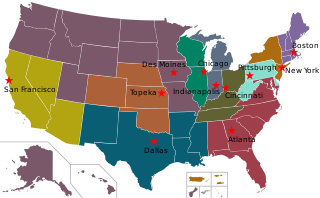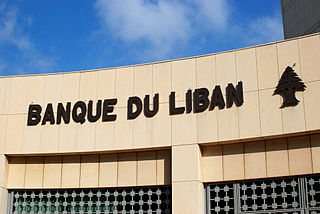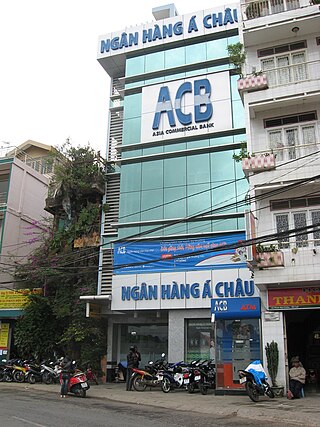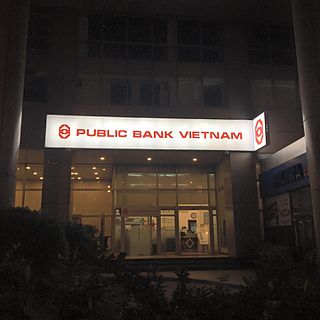Related Research Articles

The economy of Vietnam is a mixed socialist-oriented market economy, which is the 36th-largest in the world as measured by nominal gross domestic product (GDP) and 26th-largest in the world as measured by purchasing power parity (PPP) in 2022. Vietnam is a member of the Asia-Pacific Economic Cooperation, the Association of Southeast Asian Nations and the World Trade Organization.

Bank of China (Hong Kong) Limited (Chinese: 中國銀行(香港)有限公司) also known as its short name Bank of China (Hong Kong) or BOCHK (Chinese: 中銀香港), is a subsidiary of the Bank of China (via a Hong Kong-listed intermediate holding company BOC Hong Kong (Holdings)). Bank of China (Hong Kong) is the second-largest commercial banking group in Hong Kong in terms of assets and customer deposits (2008 data), with more than 190 branches across Hong Kong as of the end of 2019. It is also one of the three commercial banks licensed by the Hong Kong Monetary Authority to issue banknotes for the Hong Kong dollar.

The Hongkong and Shanghai Banking Corporation Limited, commonly known as HSBC, was the parent entity of the multinational HSBC banking group until 1991, and is now its Hong Kong-based Asia-Pacific subsidiary. The largest bank in Hong Kong, HSBC operates branches and offices throughout the Indo-Pacific region and in other countries around the world. It is also one of the three commercial banks licensed by the Hong Kong Monetary Authority to issue banknotes for the Hong Kong dollar.

The Federal Home Loan Banks are 11 U.S. government-sponsored banks that provide liquidity to the members of financial institutions to support housing finance and community investment.

Banque du Liban is the central bank of Lebanon. It was established on August 1, 1963, and became fully operational on April 1, 1964. It is currently headed by Riad Salameh.

Ho Chi Minh Stock Exchange (HOSE), formerly known as HCM Securities Trading Center, is a stock exchange in Ho Chi Minh City, Vietnam. It was established in 1998 under Decision No. 127/1998/QD-TTg of the Prime Minister of Vietnam. HCM Securities Trading Center officially opened on July 20, 2000, and had its first trading session on July 28, 2000, with two listed companies and six security company members.

Asia Commercial Bank, often abbreviated to ACB, is the largest private bank in Vietnam by assets, headquartered at 442 Nguyễn Thị Minh Khai, Ward 5, District 3, Ho Chi Minh City. It was registered on 19 May 1993 and began operations in June 1993. The bank trades at the Ho Chi Minh Stock Exchange under the symbol ACB, where it listed on December 9, 2020 after previously trading at the Hanoi Stock Exchange.
China's banking sector had ¥319.7 trillion RMB in assets at the end of 2020. The "big four/five" state-owned commercial banks are the Bank of China, the China Construction Bank, the Industrial and Commercial Bank of China, and the Agricultural Bank of China, all of which are among the largest banks in the world as of 2018. The Bank of Communications is sometimes included. Other notable big and also the largest banks in the world are China Merchants Bank and Ping An Bank.
VietJet Aviation Joint Stock Company, trading as VietJet Air, is an international low-cost airline from Vietnam. It was the first privately-owned new-age airline to be established in Vietnam, being granted its initial approval to operate by the Vietnamese Minister of Finance in November 2007. As of its launch in December 2011, it became the second private airline to offer domestic service in Vietnam, as well as the fifth airline overall to offer civil domestic flights. VietJet Air is owned by Sovico Holdings, HDBank, other organisational investors, and individual stakeholders.

PetroVietnam Joinstock Finance Corporation is a non-banking finance corporation, a subsidiary of Vietnam National Oil and Gas Group PetroVietnam.

The Orient Commercial Joint Stock Bank is a large bank located in Vietnam. Its Swift code is ORCOVNVX.

The North–South Expressway East is the most common name of an expressway in Vietnam located very close to National Route 1 an artery, smoothly between the two South and North Vietnam. Similar to National Route 1, the expressway starts from Lạng Sơn and ends at Cà Mau.
Hoang Anh Gia Lai Group, registered as Hoang Anh Gia Lai Joint Stock Company, less formally known by its trading name Hoàng Anh Gia Lai (HAGL), is a diversified company headquartered in Pleiku, Vietnam.
Nguyễn Đức Kiên is a Vietnamese businessman and owner and chairman of the Hanoi ACB football club. In addition he is deputy chairman of the Vietnam Professional Football company (VPF) that now oversees Vietnam’s V-League and First Division football.

Bao Viet is the largest Vietnamese insurance company and Vietnam's seventh largest listed company by market capitalisation. It is state-owned and has a strategic partnership with HSBC, which also holds 18% of Bao Viet's shares. HSBC is, however, soon to be replaced by Sumitomo Life. Besides various insurance products, Bao Viet has diversified into stock market trading, fond management and real estate. It also has subsidiaries in banking, hotels and construction. Bao Viet has been losing market shares in recent years and has also been making losses in the insurance sector since 2009.
Vietinbank is a state-owned Vietnamese bank. It has strategic partnerships with the International Finance Corporation and Mitsubishi UFJ Financial Group. It has a market capitalisation of VND 53.22 trillion as of late 2012, making it one of Vietnam's largest listed companies. According to the VNR500 ranking, Vietinbank is Vietnam's 13th largest company.
Water supply and sanitation in Vietnam is characterized by challenges and achievements. Among the achievements is a substantial increase in access to water supply and sanitation between 1990 and 2010, nearly universal metering, and increased investment in wastewater treatment since 2007. Among the challenges are continued widespread water pollution, poor service quality, low access to improved sanitation in rural areas, poor sustainability of rural water systems, insufficient cost recovery for urban sanitation, and the declining availability of foreign grant and soft loan funding as the Vietnamese economy grows and donors shift to loan financing. The government also promotes increased cost recovery through tariff revenues and has created autonomous water utilities at the provincial level, but the policy has had mixed success as tariff levels remain low and some utilities have engaged in activities outside their mandate.

Joint Stock Commercial Bank for Foreign Trade of Vietnam, commonly referred to as Vietcombank, is a commercial bank in Vietnam.

Public Bank Vietnam Limited (PBVN) is a bank based in Hanoi, Vietnam, offering financial services in Vietnam. It was transformed from VID Public Bank (VIDPB) - a joint venture between Bank for Investment and Development of Vietnam (BIDV) of Vietnam and Public Bank Berhad (PBB) of Malaysia with equal stake established in May 1992. The transformation completed on March 24th, 2016 and the bank officially commenced operations on April 1st, 2016.
Vietnam Technological and Commercial Joint Stock Bank, commonly referred to as Techcombank, is a publicly listed Vietnamese bank. Its shares are traded on the Ho Chi Minh City Stock Exchange under ticker TCB.
References
- 1 2 3 Vietnam country study. Library of Congress Federal Research Division (December 1987). This article incorporates text from this source, which is in the public domain.
- ↑ Archived 2013-11-25 at the Wayback Machine . Saigon Times ATMs overwhelmed by huge crowds (January 2011).
- ↑ "Vietnam to allow higher bank investments". Investvine.com. 2013-03-01. Retrieved 2013-03-05.